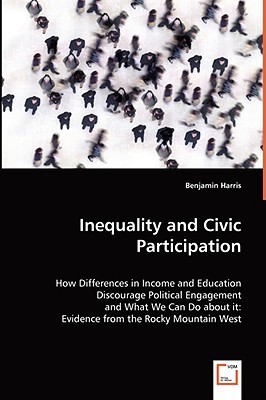
- We will send in 10–14 business days.
- Author: Benjamin Harris
- Publisher: VDM Verlag Dr. Mueller E.K.
- Year: 2008
- Pages: 132
- ISBN-10: 3639067185
- ISBN-13: 9783639067187
- Format: 15.2 x 22.9 x 0.7 cm, softcover
- Language: English
- SAVE -10% with code: EXTRA
Reviews
Description
This book considers how inequality of income and educational attain-ment affects participation in local government and community de-velopment. Adapting a standard economic model, it shows that inc-reases in inequality can decrease overall group participation and individuals' likelihood of participating. The theory predicts, however, that increasing the responsiveness of civic bodies to input from citizens can mitigate the negative effects of inequality. Original survey data from over 680 households in Missoula, Montana is then analyzed to test the implications of the theory. In Missoula, people have 3 ways of participating: not at all, alone, or in groups. The analysis shows that people living in neighborhoods with high inequality are less likely to drop out entirely, but more likely to participate alone. This effect is greatest under high educational inequality. These results support what many already know: equal access to education is a necessary ingre-dient for a healthy democracy. But they also show how governments can use new technology to promote a more vibrant and engaged citizenry.
EXTRA 10 % discount with code: EXTRA
The promotion ends in 17d.12:38:45
The discount code is valid when purchasing from 10 €. Discounts do not stack.
- Author: Benjamin Harris
- Publisher: VDM Verlag Dr. Mueller E.K.
- Year: 2008
- Pages: 132
- ISBN-10: 3639067185
- ISBN-13: 9783639067187
- Format: 15.2 x 22.9 x 0.7 cm, softcover
- Language: English English
This book considers how inequality of income and educational attain-ment affects participation in local government and community de-velopment. Adapting a standard economic model, it shows that inc-reases in inequality can decrease overall group participation and individuals' likelihood of participating. The theory predicts, however, that increasing the responsiveness of civic bodies to input from citizens can mitigate the negative effects of inequality. Original survey data from over 680 households in Missoula, Montana is then analyzed to test the implications of the theory. In Missoula, people have 3 ways of participating: not at all, alone, or in groups. The analysis shows that people living in neighborhoods with high inequality are less likely to drop out entirely, but more likely to participate alone. This effect is greatest under high educational inequality. These results support what many already know: equal access to education is a necessary ingre-dient for a healthy democracy. But they also show how governments can use new technology to promote a more vibrant and engaged citizenry.


Reviews